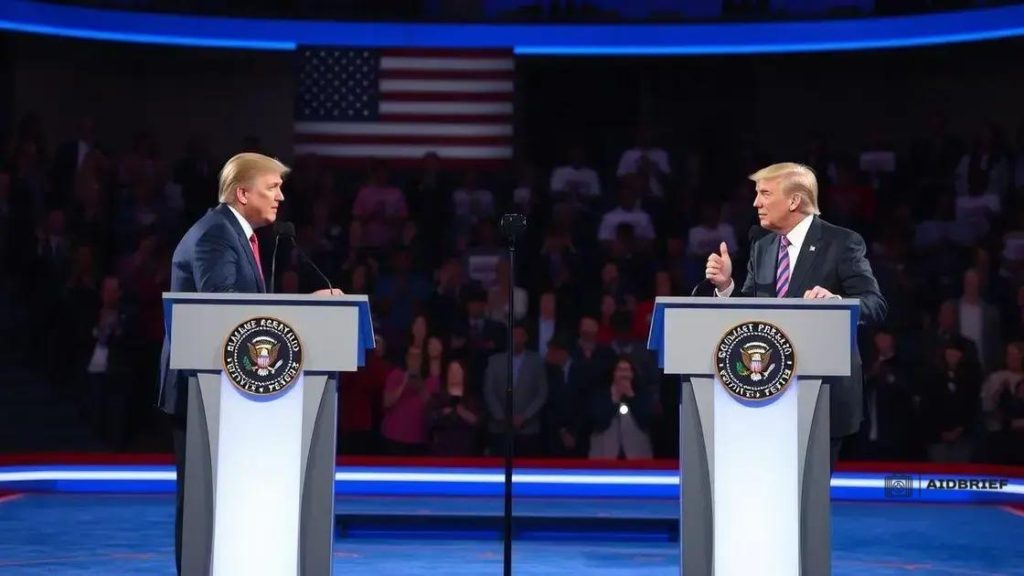Presidential debates: what to expect this election season

Presidential debates significantly impact voter turnout by raising awareness, shaping opinions, and engaging the public through real-time interactions on social media.
Presidential debates are pivotal moments in any election cycle, capturing the attention of voters and shaping opinions. Have you ever wondered how these face-offs influence your choices at the ballot box? Let’s dive into what we can anticipate this season.
The historical significance of presidential debates
The historical significance of presidential debates cannot be overstated. These debates offer a public stage for candidates to present their ideas and engage with one another, shaping how voters perceive them. Throughout American history, debates have evolved into critical turning points for campaigns.
Key Moments in Debate History
Many debates have become iconic, creating lasting impressions on the electorate. For instance, the 1960 debate between John F. Kennedy and Richard Nixon marked a pivotal moment in the use of televised appearances in politics. This debate highlighted how visual presentation could impact public perception, setting a new standard for how candidates prepare for their public engagements.
How Debates Influence Elections
Debates can sway undecided voters and reinforce the convictions of those already aligned with a party. During debates, candidates often showcase their policies and sharpen their rhetoric. The clarity of their arguments can either attract an audience or turn them away.
- Effective communication can resonate with voters.
- Memorable moments often define a candidate’s campaign.
- Public reactions can shift polling numbers significantly after a debate.
In addition to influencing voters, debates serve as a way for candidates to distinguish themselves from their opponents. The conversations that unfold during these events can reflect a candidate’s readiness to lead. When candidates engage in spirited exchanges, it can capture the public’s attention, driving further engagement.
The public’s response often showcases how debates are viewed. They can also lead to increased media coverage and analysis, which further shape the narratives surrounding the candidates. Ultimately, the historical significance of presidential debates lies in their ability to reflect societal concerns and aspirations during critical moments in history.
Key issues likely to be addressed
In every election, certain key issues likely to be addressed significantly influence debates and voter decisions. These issues often reflect the current climate and concerns within the nation, making them crucial for candidates to tackle.
Top Issues in the Spotlight
Here are some of the pressing topics that candidates usually focus on:
- Healthcare: The quality and accessibility of healthcare continue to be hot-button issues. Candidates discuss plans for reform and affordability.
- Economy: Economic policies, including taxation, job creation, and inflation, are essential as voters seek candidates who promise financial stability.
- Climate Change: Environmental policies are increasingly becoming a significant concern. Candidates must address how they plan to combat climate change and promote sustainability.
- Education: The state of education, funding for public schools, and access to higher education are crucial topics that resonate with many voters.
As debates progress, these issues may evolve based on the candidates’ responses and public interest. For instance, during the debates, healthcare often becomes a focal point, especially if new policies are proposed or if there are recent developments in the healthcare system.
Moreover, public sentiment can shift rapidly. Candidates must stay attuned to the changing priorities of voters. This responsiveness is vital for engaging effectively with the audience during debates. Each issue carries the weight of voter concerns, and candidates must prepare to articulate their stance clearly.
In conclusion, the key issues likely to be addressed during presidential debates set the tone for the election. Candidates who can effectively discuss and advocate for their positions on these subjects are more likely to resonate with the electorate.
Candidates’ debate strategies

Understanding the candidates’ debate strategies is essential for grasping how they aim to connect with voters. Each candidate has unique approaches that shape their performances on stage.
Preparing for the Debate
Preparation is crucial for success in debates. Candidates usually spend weeks honing their messages and practicing responses. They analyze their opponents’ tactics to anticipate counterarguments.
Connecting with the Audience
One key strategy involves connecting with the audience. Candidates often use personal stories and relatable anecdotes to engage voters emotionally. This connection can create a bond that resonates during and after the debate.
- Utilizing humor can break tension and make candidates more relatable.
- Addressing audience concerns shows candidates are listening.
- Body language and eye contact also play a role in establishing rapport.
Additionally, candidates may employ specific communication techniques to emphasize their points. They often repeat key phrases to help them stick in voters’ minds. By doing this, candidates can drive home their messages effectively.
Candidates also highlight their policies while addressing their opponents. Drawing contrasts can help clarify differences and offer voters a clear choice. This tactic also serves to reinforce the candidate’s stance on pressing issues.
As the debates unfold, it becomes clear that adaptability is vital. Candidates must pivot quickly based on live audience reactions and unexpected questions. Those who adapt remain relevant and maintain their message’s effectiveness.
Overall, understanding various candidates’ debate strategies provides insights into political communication and the art of persuasion. These strategies shape how they present themselves and interact with public interests.
The impact of social media on debates
The impact of social media on debates is profound and ever-growing. In today’s digital age, platforms like Twitter, Facebook, and Instagram can shape public perception instantly. Social media acts as both a tool for candidates and a platform for voters.
Real-Time Feedback
During live debates, social media provides real-time feedback. Viewers tweet and post their reactions, instantly influencing how candidates adjust their strategies. This immediate response creates pressure for candidates to address concerns quickly.
Amplifying Messages
Social media amplifies candidates’ messages far beyond traditional media coverage. Posts can go viral, reaching millions within moments. A strong statement during a debate can circulate widely, shaping narratives leading up to the election.
- Memes and clips often highlight key moments, creating lasting impressions.
- Hashtags allow users to join conversations and engage with candidates directly.
- Influencers can sway opinions by sharing their views on the debates.
Candidates utilize social media strategically, sharing selected highlights or personal reactions during and after debates. This approach strengthens their visibility and allows for direct engagement with supporters. By crafting posts that resonate, they can mobilize support efficiently.
Moreover, misinformation can spread just as quickly on social media. Misleading clips or quotes can confuse voters and distort reality. Candidates must navigate this challenge carefully to maintain credibility while encouraging open dialogue.
Ultimately, the impact of social media on debates cannot be overlooked. It drives conversations and impacts voter engagement in unprecedented ways, setting the stage for the digital future of political discourse.
How debates affect voter turnout
The way in which debates influence voter turnout is significant and multifaceted. Debates provide a platform where candidates can directly engage with the public, allowing voters to resonate with their messages. This interaction often compels individuals to participate in elections.
Building Awareness
Debates increase awareness of the election and the candidates involved. When people see candidates discussing their positions, they become more informed about the choices available. This heightened awareness can lead to increased voter interest and attendance at the polls.
Shaping Opinions
Furthermore, debates can shape opinions and change the way voters feel about candidates. A strong performance can sway undecided voters, while a weak one might discourage support. This dynamic means that candidates must not only perform well but also connect with the electorate to drive turnout.
- Persuasive Messaging: Candidates must communicate their policies clearly to persuade voters.
- Engagement: How candidates engage with topics can ignite passion in voters.
- Relatability: Candidates who share personal stories can connect better with voters.
Additionally, engaging debates can mobilize younger voters. Social media buzz during and after debates can further amplify interest. When young people discuss their views online, it encourages others in their circles to participate, increasing overall turnout.
Moreover, debates often spotlight critical issues that resonate with voters’ concerns. If candidates address pressing topics like healthcare or education, it prompts voters to consider how those issues impact their lives, which can lead to greater participation.
The overall impact of debates on voter turnout is clear. By raising awareness, shaping opinions, and engaging voters, debates play a crucial role in the democratic process, encouraging participation in elections.
FAQ – Frequently Asked Questions about Presidential Debates
How do presidential debates influence voter turnout?
Presidential debates raise awareness about candidates and key issues, making voters more informed and likely to participate in elections.
What strategies do candidates use during debates?
Candidates use various strategies, including personal anecdotes, clear messaging, and real-time engagement with the audience to connect and persuade voters.
What role does social media play during debates?
Social media provides real-time feedback and amplifies candidates’ messages, allowing for immediate public engagement and discussion about the debates.
Why are debates important for the democratic process?
Debates showcase candidates’ policies and personalities, allowing voters to make informed choices and engage in the democratic process effectively.





